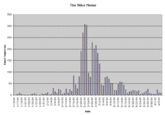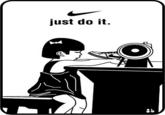Overview
The Nike ID Sweatshop E-mail Controversy refers to a series of culture jamming[19] correspondence that took place in 2001 between Buzzfeed founder Jonah Peretti[1] and Nike customer service over a pair of shoes he had ordered with the word “sweatshop” embroidered on them.
Background
In 1999, Nike launched the Nike ID[2] shop, an online footwear shop that allowed consumers to customize their footwear in details, from choosing the colors to picking out its fabric composition. In 2001, Jonah Peretti, then a graduate student at the MIT Media Lab, ordered a pair of the customized shoes with the word “sweatshop” embroidered on them. Upon receiving Peretti's order, Nike cancelled his order, which resulted in a series of six emails back and forth between Peretti and an unknown Nike representative who stated that the company reserves the right to cancel any order they deem as containing “material that we consider inappropriate or simply do not want to place on our products.”

Nike's Sweatshop Labor Controversy
Footwear brand Nike has been accused of using sweatshop labor to produce their merchandise since as early as the 1970s.[3] In 1998, consumer activist Marc Kasky filed a lawsuit[4] against Nike asserting that the company's distribution of products with the statement that it does not use sweatshop labor contained false advertising and misinformation. As of 2010, Nike is still accused of using sweatshop labor in their overseas factory, according to the court testimonies[5] of two female workers from Honduras representing 1700 workers who were laid off in 2009 without notice or severance pay.
Notable Developments
The emails were originally intended to be published in Harpers magazine, but they chose not to run them at the last minute. Peretti then forwarded the email to ten people, including Timothy Shey, who hosted them on his personal website[6] on January 17th, 2001. Peretti's correspondence continued to spread via emails and within 24 hours, it reached the inbox of one of the engineers at Customatix, a now defunct mail-to-order footwear shop, who sent Peretti an email informing him there is a seven character limit on their embroidery designs.

News Media Coverage
On January 24th, 2001, now-defunct tech blog Lot 49[8] reported on the viral e-mail correspondence, receiving its first recognition outside of Peretti’s circle of friends. Several days later, the San Jose Mercury News became the first traditional media outlet to share the emails. In the following months, Peretti's exchange with Nike was covered by a diverse range of news media outlets, from well-known publications like TIME, The Village Voice[12], Guardian[14] and The Independent[15] to online news communities and blogs including Metafilter[9], Slashdot, Salon[10] and Adbusters.[18] The news coverage eventually led Nike to issue a ban against several words from being embroidered onto their products, including Sweatshop, Sweat Shop, Child Labor, ChildLabor, Exploit and Swetshop.
TV Appearance
On February 28th, 2001, Peretti made an appearance on NBC’s Today Show, facing Nike’s spokeperson and Director of Global Issues Management Vada Manager[21] in a debate moderated by Katie Couric. The debate was also covered by Sports Business Daily[22] and the Ludwig von Mises Institute blog.[23] Following the broadcast of the debate, Manager released a statement reporting that custom shoe sales on the Nike iD site reached their third-highest in a single day on Wednesday.


Statistical Analysis
In March 2001, Peretti wrote about his experience in an op-ed piece for the Nation[20] as well as in an online essay titled "Culture Jamming, Memes, Social Networks, and the Emerging Media Ecology."[24] He also released a statistical report graphing the 3655 emails he received between January 15th and April 5th, 2001 (below, left) and the influx of traffic to Shey’s archive page (below, right) breaking down the amount of attention the emails were getting during that time period. According to Peretti, he received more than 500 emails a day at the peak of circulation.


Search Interest
[not available]
External References
[1] Wikipedia – Jonah Peretti
[3] Wikipedia – Nike Sweatshops
[4] Business and Human Rights Resource Centre – Case profile: Nike lawsuit (Kasky v Nike, re denial of labour abuses)
[5] Labor Notes – Nike’s Love Affair with Sweatshops: Still Doing It
[6] Shey.net – A History of the Nike Emails
[7] Webarchive – Clean Clothes Campaign
[8] Lot 49 – I received the following email
[9] Metafilter – February 4, 2001
[10] Salon – The postmodernist problem</a.
[12] the Village Voice – Making Nike Sweat
[13] Slashdot – Nike: Just Don't Do It
[15] The Independent – Make your mark on our trainers? Sure, no sweat
[17] SF Gate – An E-Mail Legend In His Own Time
[18] Adbusters – The Shoe They Wouldn't Sell
[19] Wikipedia – culture jamming
[20] The Nation – My Nike Media Adventure
[21] Forbes – Vada Manager
[22] Sports Business Daily – Peretti Hits NBC's Morning Show To Discuss Issue With Nike
[23] Ludwig von Mises Institute – Nike is RIght
[24] Culture Jamming, Memes, Social Networks, and the Emerging Media Ecology
Recent Videos
There are no videos currently available.

![463.jpeg NIKEil) shippingreturns D custom need help building your NIKE iD ord HI BANDWIDTH LOW BANDWIDTH → PROGRESS TRACKER 》刀 [ 1 /3 ] ID → Air Max iD Running US Create a pair that?s all you with your choice of upper material, customizable colors, and your very own Personal iD $140-](https://i.kym-cdn.com/photos/images/list/000/364/567/463.jpeg)











Comments ( 6 )
Sorry, but you must activate your account to post a comment.
Please check your email for your activation code.